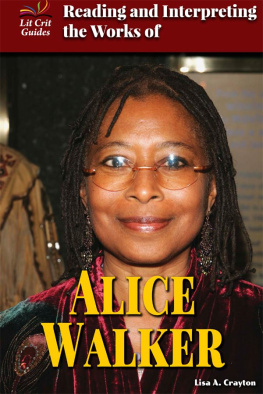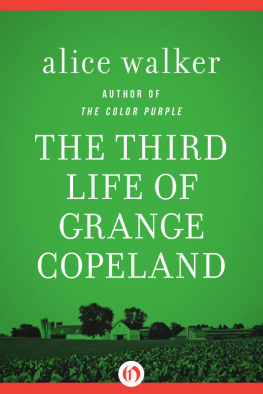Published in 2017 by Enslow Publishing, LLC
101 W. 23rd Street, Suite 240, New York, NY 10011
Copyright 2017 by Enslow Publishing, LLC
All rights reserved.
No part of this book may be reproduced by any means without the written permission of the publisher.
Library of Congress Cataloging-in-Publication Data
Names: Crayton, Lisa A., author.
Title: Reading and interpreting the works of Alice Walker / Lisa A. Crayton.
Description: New York, NY : Enslow Publishing, 2017. | Series: Lit crit guides | Includes bibliographical references and index.
Identifiers: LCCN 2016026260 | ISBN 9780766083592 (library bound)
Subjects: LCSH: Walker, Alice, 1944-Criticism and interpretationJuvenile literature.
Classification: LCC PS3573.A425 Z59 2016 | DDC 813/.54dc23
LC record available at https://lccn.loc.gov/2016026260
Printed in China
To Our Readers: We have done our best to make sure all website addresses in this book were active and appropriate when we went to press. However, the author and the publisher have no control over and assume no liability for the material available on those websites or on any websites they may link to. Any comments or suggestions can be sent by email to
Photo Credits: Cover, p. 3 Peter Kramer/Getty Images; pp. 6, 33, 49, 94 AP Images; p. 17 Anthony Barboza/Archive Photos/Getty Images; p. 21 John D. Kisch/Separate Cinema Archive/Archive Photos/Getty Images; p. 24 MPI/Archive Photos/Getty Images; p. 30 Library of Congress Prints and Photographs Division; pp. 35, 40, 42, 80 Bettmann/Getty Images; p. 46 Images Press/Archive Photos/Getty Images; p. 51 Archive Photos/Moviepix/Getty Images; p. 56 Mondadori Portfolio/Getty Images; pp. 59, 62, 66 Michael Ochs Archives/Moviepix/Getty Images; p. 68 Walter McBride/Wire- Image/Getty Images; p. 71 Per-Anders Pettersson/Hulton Archive/Getty Images; p. 84 Michael Ochs Archives/Getty Images; p. 87 AF archive/Alamy Stock Photo; p. 91 Stefan Zaklin/Getty Images; p. 92 Jamie McCarthy/Getty Images.

Alice Walker
U NVEILING S ECRETS: B ACKGROUND OF A LICE W ALKER
Did This Happen to Your Mother? Did Your Sister Throw up a Lot?
T hese intriguing questions form the title of a poem by Alice Walker, a renowned African American author. Walkers work includes poems, short stories, novels, and nonfiction essays. She started writing as a child and had her first collection of poems published a few years after she graduated from college. She went on to become a Pulitzer Prize-winning author as well as a fervent activist for human rights.
Walkers collection of poems, Good Night, Willie Lee, Ill See You in the Morning, was first published in 1975. Did This Happen to Your Mother? Did Your Sister Throw up a Lot? is part of that collection and is a good example of the type of vivid poetry for which Walker is known. The title raises questions, none of which can be answered by baffled readers who try to find meaning simply from the title. These stumped readers, however, may find help in the poems first lines:
I love a man who is not worth
my love.1
Readers are enlightened. The questions refer to love. Indeed, Did This Happen to Your Mother? Did Your Sister Throw up a Lot? is a love poem. In it, Walker wonders whether other women have experienced similar conflicting emotional and physical effects of love. Admittedly, love can be exciting, fun, scary, or a combination of these and other emotions. Or worse. Love has made me sick, writes Walker.2 How sick?
... My stomach sits jumpy in my chest.
My chest is the Grand Canyon
sprawled empty
over the world.3
This emotive writing explores the depth of feelings associated with being lovesick. Drawing to the close of the poem, she admits she will never tell the loved one that he is unworthy of her affection. Its conclusion invites a rereading. Why? The anguish described in the poem is relatable for many readers. It is also a good example of how Walker weaves universal topics into her writing.
emotive
Emotional, sensitive; able to engage readers senses.
Sharing Rainbows
In Walkers many years of writing, she has tackled various genres. Plainly, her achievements as a writer are characterized by an astonishing versatility. She is equally at home with poetry and fictionit is worth remembering that she was first published as a poet, not as a novelist or fiction writer. Indeed, as an essayist alone she would be a noteworthy presence in America letters.4
Collectively, Walkers work examines life in all its beauty and ugliness. Critic Barbara Christian notes, Alice Walkers works are quiltsbit and pieces of used material rescued from oblivion for everyday use. She takes seemingly ragged edges and arranges them into works of function though terrifying beauty.5 This quilt analogy is especially apt, given Walkers memories of her own mother making quilts when Walker was a child.
Q UILTS
In Walkers short story Everyday Use, quilts are a symbol of heritage. Questions arise regarding the purpose of those quilts. Should they be hung for decoration or enjoyed for everyday use? Ultimately, Walker reveals that celebrating ones heritage includes the daily enjoyment of family heirloomseven if they arent priceless.
Quilting is a tradition that dates back to the early years of America. English and Dutch settlers brought their own traditions of quilting when they first came to the New World. And as soon as slavery was established, African Americans also made quilts. Some slaves made them because they were forced to perform the task. Others did so to add extra warmth to cold sleeping quarters. At times, slaves were even able to sell quilts for money.
Quilts are made by piecing together squares of material. These can be cut from old clothing, blankets, or anything else from which material can be reused. The squares are then stitched together by hand or machine. Some quilts are simple; others are quite elaborate. Many quilts have themes associated with them. Patriotism, family life, seasons, and holidays are common quilt themes. Religion and spirituality are also popular themes. Quilts made for special occasions like baby showers, birthdays, and weddings all focus on those key topics. Quilts can reflect every area of life, and the themes available for use are nearly limitless.
In her writing, Walker explains that she is personally acquainted with the quilt-like quality of life. In the preface to the poetry collection Hard Times Require Furious Dancing, she notes:
Once a person of periodic deep depressions, a sign of mental suffering in my family that affected each sibling differently, I have matured into someone I never dreamed I would become: an unbridled optimist who sees the glass as always full of something. It may be half full of water, precious in itself, but in the other half theres a rainbow that could exist only in the vacant space.6
Writing from a deep well of personal experiences, Walker takes on roles of writer and activist. Thus, readers can expect to read about topics such as interracial relationships and political activism. She also writes about issues she believes need to be exposed and addressed. In















